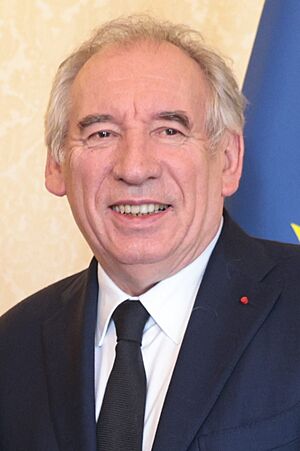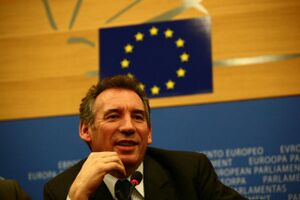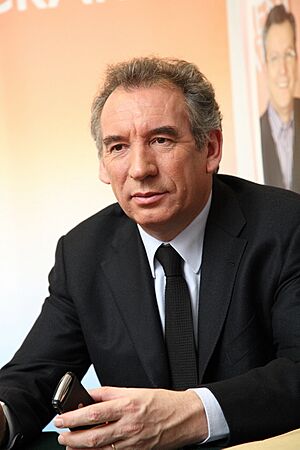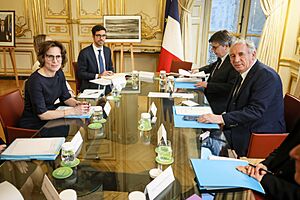François Bayrou facts for kids
Quick facts for kids
François Bayrou
|
|||||||||||||||||||||||||||||||
|---|---|---|---|---|---|---|---|---|---|---|---|---|---|---|---|---|---|---|---|---|---|---|---|---|---|---|---|---|---|---|---|

Bayrou in 2025
|
|||||||||||||||||||||||||||||||
| Prime Minister of France | |||||||||||||||||||||||||||||||
| In office 13 December 2024 – 9 September 2025 |
|||||||||||||||||||||||||||||||
| President | Emmanuel Macron | ||||||||||||||||||||||||||||||
| Preceded by | Michel Barnier | ||||||||||||||||||||||||||||||
| Succeeded by | Sébastien Lecornu | ||||||||||||||||||||||||||||||
| Minister of Justice | |||||||||||||||||||||||||||||||
| In office 17 May 2017 – 19 June 2017 |
|||||||||||||||||||||||||||||||
| Prime Minister | Édouard Philippe | ||||||||||||||||||||||||||||||
| Preceded by | Jean-Jacques Urvoas | ||||||||||||||||||||||||||||||
| Succeeded by | Nicole Belloubet | ||||||||||||||||||||||||||||||
| Minister of National Education | |||||||||||||||||||||||||||||||
| In office 29 March 1993 – 4 June 1997 |
|||||||||||||||||||||||||||||||
| Prime Minister | Édouard Balladur Alain Juppé |
||||||||||||||||||||||||||||||
| Preceded by | Jack Lang | ||||||||||||||||||||||||||||||
| Succeeded by | Claude Allègre | ||||||||||||||||||||||||||||||
| Mayor of Pau | |||||||||||||||||||||||||||||||
| Assumed office 4 April 2014 |
|||||||||||||||||||||||||||||||
| Preceded by | Martine Lignières-Cassou | ||||||||||||||||||||||||||||||
| President of the Democratic Movement | |||||||||||||||||||||||||||||||
| Assumed office 2 December 2007 |
|||||||||||||||||||||||||||||||
| Preceded by | Position established | ||||||||||||||||||||||||||||||
| President of the European Democratic Party | |||||||||||||||||||||||||||||||
| Assumed office 13 July 2004 |
|||||||||||||||||||||||||||||||
| Preceded by | Position established | ||||||||||||||||||||||||||||||
| President of the Union for French Democracy | |||||||||||||||||||||||||||||||
| In office 25 February 1998 – 30 November 2007 |
|||||||||||||||||||||||||||||||
| Preceded by | François Léotard | ||||||||||||||||||||||||||||||
| Succeeded by | Position abolished | ||||||||||||||||||||||||||||||
|
|||||||||||||||||||||||||||||||
|
|||||||||||||||||||||||||||||||
| Personal details | |||||||||||||||||||||||||||||||
| Born | 25 May 1951 Bordères, France |
||||||||||||||||||||||||||||||
| Political party | MoDem (since 2007) | ||||||||||||||||||||||||||||||
| Other political affiliations |
CD (1974–1976) CDS (1976–1995) FD (1995–1998) UDF (1978–2007) |
||||||||||||||||||||||||||||||
| Spouse |
Élisabeth Perlant
(m. 1971) |
||||||||||||||||||||||||||||||
| Children | 5 | ||||||||||||||||||||||||||||||
| Alma mater | University Bordeaux Montaigne | ||||||||||||||||||||||||||||||
| Signature |  |
||||||||||||||||||||||||||||||
François Bayrou (born 25 May 1951) is a French politician who served as the Prime Minister of France from December 2024 to September 2025. He is known for his long career in French politics and for his centrist views, which means he holds ideas that are in the middle of the political spectrum.
Bayrou has led the Democratic Movement (MoDem) party since he created it in 2007. He has also been the president of the European Democratic Party since 2004. He ran for president of France three times, in 2002, 2007, and 2012.
Besides his work in national politics, he has been the mayor of the city of Pau since 2014.
Contents
Early Life and Education
François Bayrou was born on May 25, 1951, in Bordères, a small village in the southwest of France. His father, Calixte Bayrou, was a farmer and also served as the mayor of their village.
As a child, François had a stutter and went to speech therapy for seven years to overcome it. He loved to read and studied literature at a university in Bordeaux. At age 23, he passed a very difficult exam called the "agrégation," which allowed him to become a teacher in high schools.
Before he became a full-time politician, Bayrou taught history. He has also written several books about history, including one about King Henry IV of France. He lives on the same farm where he grew up and enjoys raising horses.
A Long Career in Politics
Bayrou started his political journey in the 1970s. He joined a political party that believed in centrist ideas. Over the years, he held many important jobs in both local and national government.
Minister and Party Leader
In 1993, Bayrou became the Minister of National Education, putting him in charge of all the schools in France. He held this important job for four years under two different prime ministers.
In 1998, he became the leader of a political party called the Union for French Democracy (UDF). He wanted the UDF to be a strong party in the center of French politics, separate from the main parties on the left and the right.
Running for President
François Bayrou ran for president of France three times. His most successful campaign was in 2007, when he surprised many people by finishing in third place with over 18% of the vote. This showed that many French voters were looking for a centrist choice.
Although he did not win, his strong result made him a very important figure in French politics. After the 2007 election, he decided to create his own political party.
The Democratic Movement (MoDem)
In 2007, Bayrou founded the Democratic Movement, or MoDem. He wanted this party to be a home for people who did not feel represented by the traditional left-wing or right-wing parties. He has been the leader of MoDem ever since.
Working with President Macron
In the 2017 presidential election, Bayrou decided not to run himself. Instead, he chose to support another centrist candidate, Emmanuel Macron. After Macron won the election, he named Bayrou as his Minister of Justice.
Bayrou's time as minister was very short. He resigned after about a month because of an investigation into his party's finances. In 2024, he was cleared of any wrongdoing in this matter.
Prime Minister of France
On December 13, 2024, President Emmanuel Macron appointed François Bayrou as the new Prime Minister of France. This happened after the previous government, led by Michel Barnier, lost a vote of no confidence. A vote of no confidence is when the parliament shows it no longer supports the government, forcing it to resign.
As prime minister, Bayrou faced many big challenges, especially with the country's finances. He said his government had to climb a "Himalaya of difficulties."
His time as prime minister was also short. On September 8, 2025, his government lost a confidence vote in the National Assembly. This happened because many members of parliament disagreed with his government's budget plans. He officially resigned the next day.
What He Believes In

François Bayrou has always been a strong supporter of the European Union. He has called it "the most beautiful construction of all humanity" and believes France should play a leading role in it.
His political ideas focus on:
- Creating jobs.
- Improving schools and education.
- Making sure the government does not spend more money than it has.
- Protecting civil liberties, which are the basic rights and freedoms of people.
He has also spoken out on world issues. For example, he called for France to boycott the 2008 Summer Olympics in China to protest the country's human rights record. He is also a supporter of regional languages and cultures in France.
Images for kids
See also
 In Spanish: François Bayrou para niños
In Spanish: François Bayrou para niños
 | Laphonza Butler |
 | Daisy Bates |
 | Elizabeth Piper Ensley |




